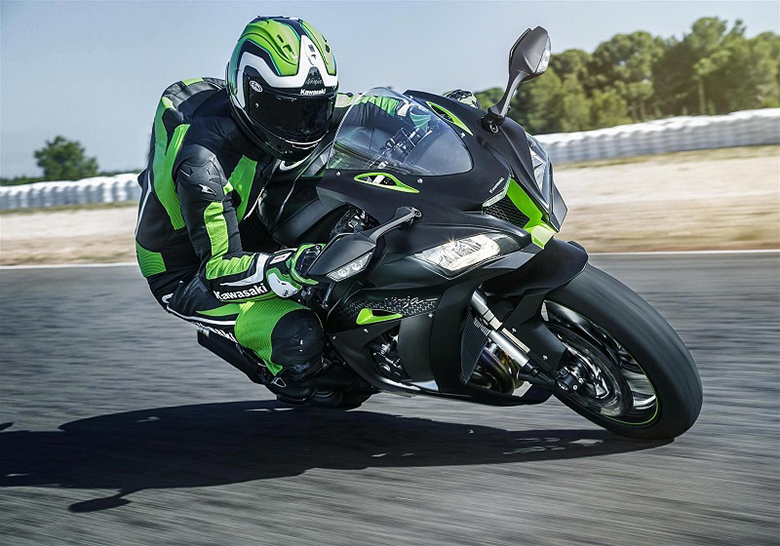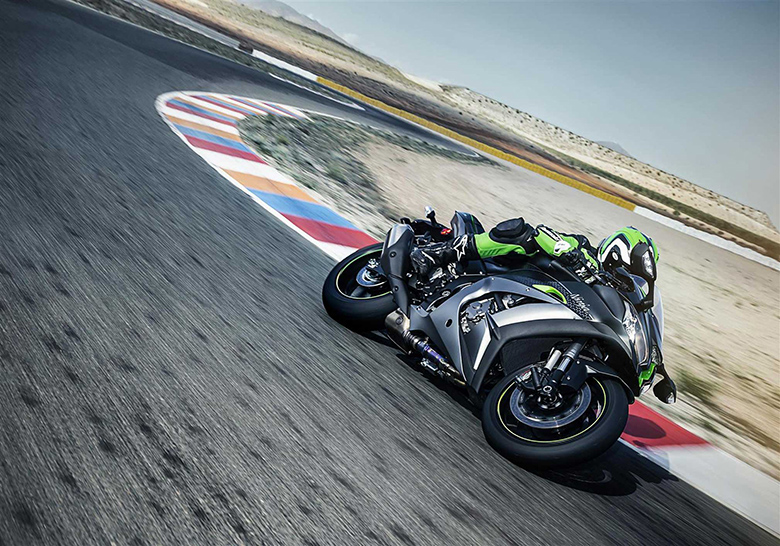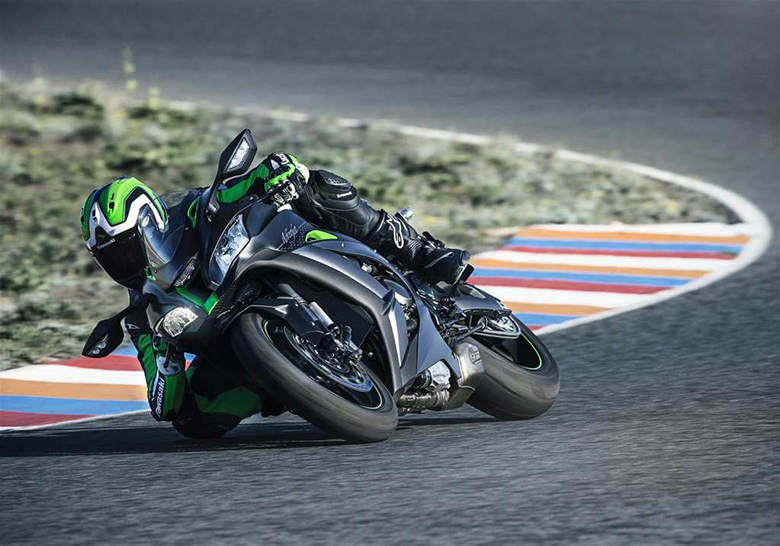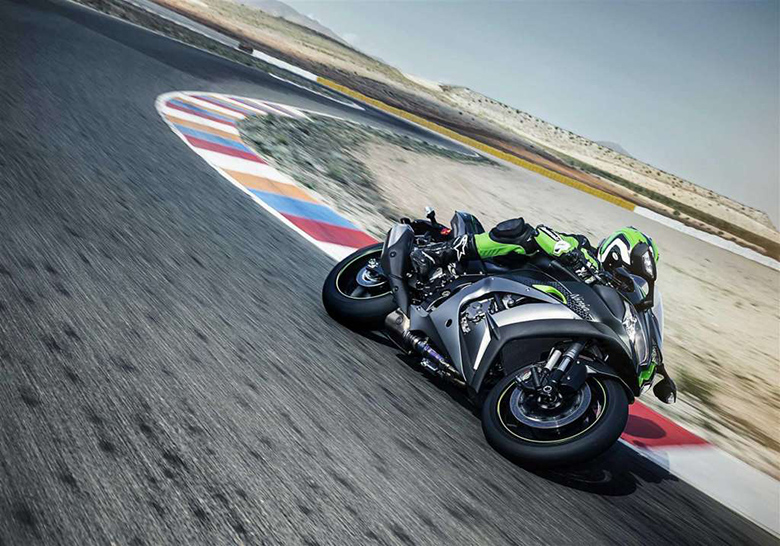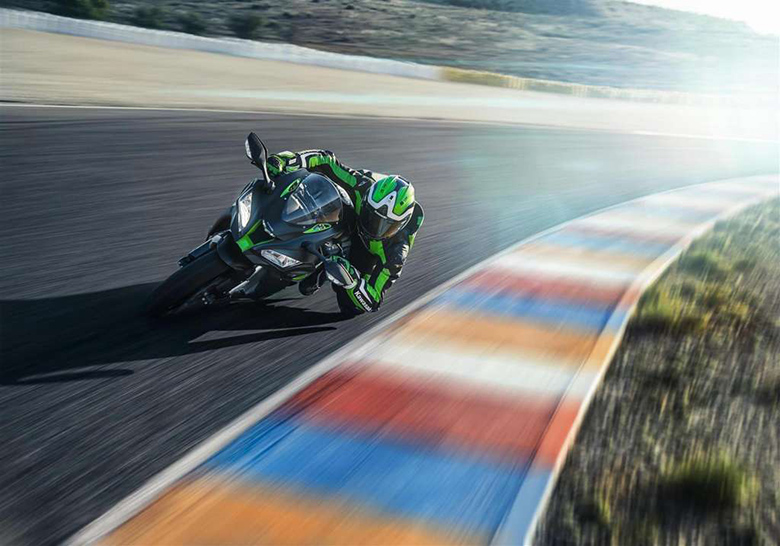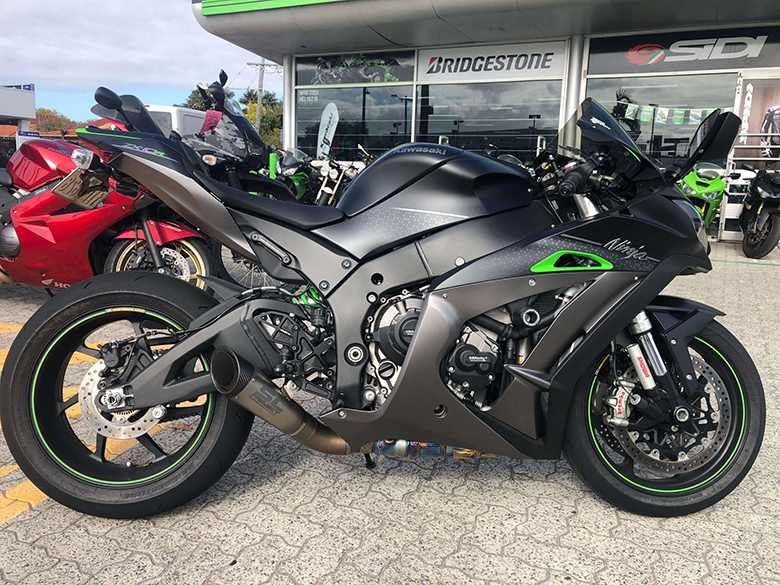The 2018 Kawasaki Ninja ZX-10R SE Powerful Heavy Bike is another unique masterpiece of Kawasaki. It features a highly advanced electronic package that helps the rider achieve better performance on both street and track. The suspension’s damping character provides the top level of comfort under all circumstances. The new Kawasaki Ninja ZX-10R SE offers the best and can leave everyone behind. The Kawasaki Racing Team and the Kawasaki Factory in Japan worked together to build the Kawasaki Ninja ZX-10R SE. It is tested and approved by the World Champion Jonathan Rea and Tom Sykes as well. The motorcycle is available in Metallic Carbon Gray/ Metallic Matte Carbon Gray paint and its full review along with price and specifications is given below.
2018 Kawasaki Ninja ZX-10R SE Powerful Heavy Bike – Features and Price
Exclusive on this Version
The 2018 Ninja ZX-10R SE is available in three different riding modes i.e., Road, Manual and Track. The Road and Track modes offer a a softer and firmer base setting that suites the respective riding styles. The Manual mode, on the other side, allows the rider to tailor the rebound and compression damping base setting to suit preference and riding style. The manual settings (15 levels each) are selected electronically via the instrument panel and in all of these settings, the KECS adjusts damping for vehicle speed, deceleration and stroke speed.
Forged Wheels
The motorcycle has 7-spoke multi-direction forged aluminum wheels that are jointly developed with Marchesini contribute to its lighter handling.
Kawasaki Quick Shifter (KQS)
This system allows the rider to have both clutchless upshift and downshift during the race. It is specially designed for effective sport riding and it can be used on the street at rpm above 2,500 min-1.
Electronic Suspension
The suspension systems have been jointly developed with Showa, KECS that adds electronically controlled damping to the high-spec Balance Free Front Fork and BFRC lite rear shock equipped on the bike. The semi-active system adapts to the road and riding conditions in the back time offers an ideal amount of damping. It is combined with advanced race-developed mechanical components with the latest electronic control technology. The KECS offers both suppleness to handle the variety of riding situations. The tires provide a confident, cornering experience.
1 Millisecond
Now, the rider can control via a solenoid valve with direct actuation. It results in rapid reaction time i.e., just one millisecond. This quick reaction time makes it super cool and ideal for super sports applications where the natural feeling is critical to feeling at one with the bike.
KECS KCU
It is built-in stroke sensors on both the fork and rear shock, and it is the unique features used in Ninja ZX-10R SE. It offers real-time stroke speed and compression information. The sensor coils provide input to the KECS ECU every one millisecond. It is complemented by the information provided by the IMU every ten milliseconds and FI ECU every ten milliseconds. It then directs current to the solenoids to adjust damping as required by the situation.
Power Modes
The Power modes used in the motorcycle allow the available power and throttle response to be selected to suit conditions. In Ninja ZX-10R SE, three methods are available i.e., Full, Low and Middle. In the Middle mode, performance varies depending on the engine speed and throttle position. At less than 50% throttle application, engine performance is essentially the same as in the Low mode. Furthermore, opening the throttle past 50% allows the interpretation up to the Full power to be accessed. This advanced engine management system gives mild engine character for everyday riding situations. The Variable Middle Mode allows the rider to alter engine performance and delivery accordingly. This kind of technology ensures a supersport machine to be enjoyed in a broader range of situations.
Launch Control Mode
The new Launch Control Mode helps the rider to get a better start during the race. It was first used in the Kawasaki KX450F to ensure significant lead in the Motorcross championship. This mode is simply activated by pressing the button on the handlebar and its map slightly retards ignition timing that helps tame the engine’s strong torque and reduces wheel spin off the start. It only activates in the first two gears and disengages in third gear. This system gives a more significant advantage when lining up at the gate and puts them in a better position to win.
Horizontal Black-Link Rear Suspension
The Kawasaki Ninja ZX-10R comes with the horizontal rear suspension. The Kawasaki’s original suspension arrangement locates the shock unit close to the center of gravity. Since no linkage or shock unit is protruding beneath the swingarm, it frees up enough space for a larger exhaust pre-chamber. The large pre-chamber and silencer volume can be reduced and heavy exhaust components can be concentrated to the center of the bike, which results in more excellent handling.
Another benefit is that the shock unit is placed far away from exhaust heat. It is challenging for heat from the exhaust system to affect suspension oil and gas pressure adversely. The horizontal back-line rear suspension provides secondary benefits like that.
Economical Riding Indicator
Thanks to the high-precision electronic control for engine management, Kawasaki models can achieve a high level of fuel efficiency. The fuel consumption is greatly affected by the throttle use and some other elements under the rider’s control. The Economical Riding Indicator indicates when current riding conditions are consuming a low amount of fuel. The system continuously monitors fuel consumption, engine speed, throttle position and other riding conditions. The fuel consumption is down for a given rate and the ECO mark appears on the instrument panel’s LCD screen. By riding the ECO, the character remains on fuel consumption can be reduced.
S-KTRC (Sport – Kawasaki Traction Control)
The S-KTRC is the Kawasaki’s original predictive traction control that uses the same base technology as the Kawasaki works machines competed in MotoGP. This technology controls the rear wheel slip that usually occurs when power is applied. Generally, the maximum forward drive requires a certain amount of fall. To ensure a significant transfer of power to the tarmac, the S-KTRC monitors the slip ratio in real time. It governs engine power delivery to optimize rear wheel traction. The S-KTRC monitors various parameters including front and rear speed, throttle position and engine rpm.
Kawasaki Engine Brake Control
The Kawasaki Engine Brake Control system enables the rider to choose the right amount of engine braking. When this system is activated, the engine braking effect is reduced, offering less interference when riding on the track.
Electronic Throttle Valves
The Kawasaki’s fully electronic throttle actuation system that enables the ECU to control the volume of both the fuel and the air delivered to the engine. The bike has ideal fuel injection and throttle valve position that results in a smooth and natural engine response. This new system also makes a significant contribution to reduced emissions. An electronic throttle valve also enables more precise control of the electronic engine management system like KTRC and S-KTRC. It also allows the implementation of an electronic system like KLCM, Cruise Control and Kawasaki Engine Brake Control.
2018 Kawasaki Ninja ZX-10R SE Powerful Heavy Bike – Price
The Kawasaki Ninja ZX-10R SE is available at $24,544.
2018 Kawasaki Ninja ZX-10R SE Powerful Heavy Bike – Technical Specifications
Engine
| Displacement | 998cc |
| Type | 4-stroke, In-Line Four |
| Bore & stroke | 76 mm x 55 mm |
| Cooling | Liquid |
| Compression ratio | 13.0:1 |
| Valve system | DOHC, 16 valves (4-valve-per-cylinder) |
| Fuel system | Fuel injection: ø47 mm x 4 having a dual injection |
| Ignition | Digital |
| Lubrication | Forced lubrication, wet sump including oil cooler |
Brakes
| Front: Type | Dual semi-floating ø330 mm Brembo discs |
| Front: calipers | Dual radial-mount, Brembo M50 monobloc, opposed 4-piston |
| Rear: Type | Single 220 mm disc |
| Rear: calipers | Single-bore pin-slide |
Dimensions
| Overall length | 2,090 mm |
| Overall width | 740 mm |
| Overall height | 1,145 mm |
| Wheelbase | 1,440 mm |
| Ground clearance | 145 mm |
| Seat height | 835 mm |
| Curb mass | 208 kg |
| Fuel capacity | 17 liters (3.7 gals.) |
Drivetrain
| Transmission | 6-speed, return |
| Final drive | Chain |
| Primary reduction ratio | 1.681 (79/47) |
| Gear Ratios | 1st: 2.600 (39/15) 2nd:2.214 (31/14) 3rd:1.944 (35/18) 4th:1.722 (31/18) 5th:1.550 (31/20) 6th:1.391 (32/23) |
| Final reduction ratio | 2.294 (39/17) |
| Clutch | Wet multi-disc, manual |
Frame
| Type | Twin spar, cast aluminum |
| Wheel travel: front | 120 mm (4.7 inches) |
| Tire: front | 120/70-ZR17M/C (58W) |
| Wheel travel: rear | 114 mm (4.5 inches) |
| Tire: rear | 190/55-ZR17M/C (75W) |
| Caster (rake) | 25º |
| Trail | 107 mm (4.2 inches) |
| Steering angle (left/right) | 27º/27º |
Performance
| Maximum Torque | 114.6 N.m {11.7 kgf.m} @ 11,500 rpm |
Suspension
| Suspension, front | Horizontal Back-link, BFRC lite gas-charged shock with piggyback reservoir, KECS-controlled compression and rebound damping, manual spring preload adjustability, and top-out spring |
| Suspension, rear | ø43 mm inverted Balance Free Front Fork with external compression chamber, KECS-controlled compression and rebound damping with manual spring preload adjustability and top-out springs |
Details
| Warranty | 12 months warranty |

